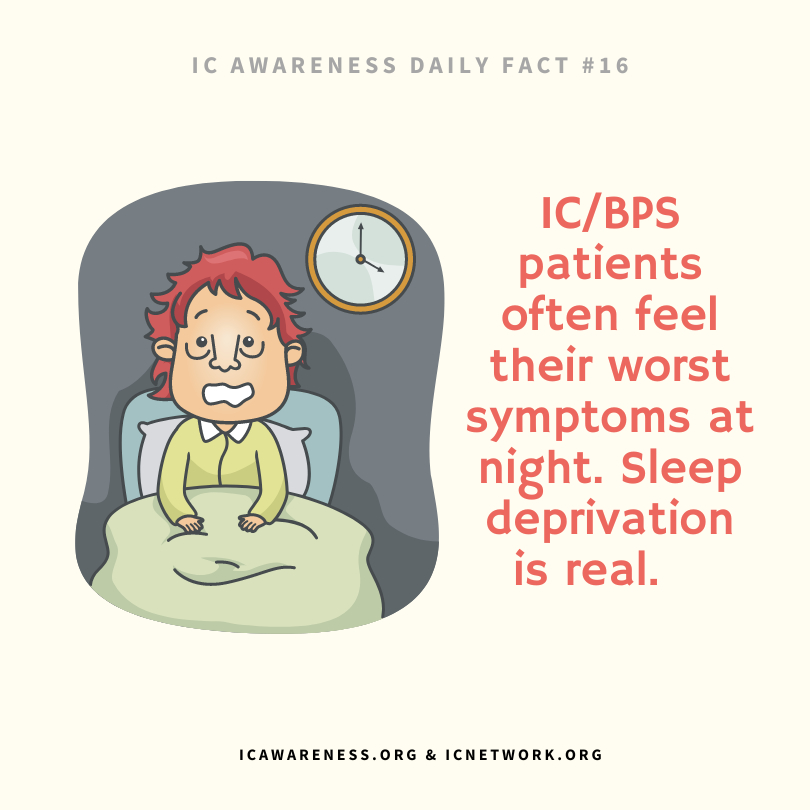
IC patients often experience their most uncomfortable symptoms at night when distractions are fewer and they notice their bladder symptoms more. They may feel a constant need to urinate or an uncomfortable sensation of bladder fullness that is very difficult to ignore. Getting up once or twice a night might be manageable but having more frequency can certainly be disruptive and rob a patient of essential rejuvenative sleep. Some patients have even resorted to sleeping in their bathrooms. The good news is that there are many therapies and self-help strategies that may help!
Tips To Improve Sleep Quality
1. Follow the IC Diet.
Night time sleep quality is often a direct reflection of foods eaten during the day. If you’re still drinking coffees, green teas and sodas, this could easily explain your higher pain and/or difficulty in finding sleep. Caffeine and alcohol, in particular, can be irritating to the bladder.
2. Treat your Pain.
Pain and sleeplessness can be an IC patients constant companion. When pain is intense, it is virtually impossible to sleep comfortably and if you don’t sleep well, that can also intensify pain. Thus, breaking the pain cycle is important. Some patients use OTC products, such as PEAORA, AZO Urinary Pain Relief Tablets, to help break the pain. Others find that products such as ProSirona or Tiger Balm can help. But, more intense pain may require stronger pain medication, such as an opiate. If the OTC products aren’t helping, then talk with your doctor about your pain and need for sleep. A referral to a pain specialist may be important.
3. Calm and Relax Your Pelvic Pain
 Tight, spasming pelvic floor muscles can certainly trigger night time discomfort. Many patients find some comfort by taking a hot shower before bed and/or using a heating pad to relax the pelvic floor. (Just remember that you should not fall asleep with an electric heating pad on UNLESS it as an automatic shut off timer. Burns can happen.) Using a Guided Relaxation as you try to sleep could be very helpful in relaxing the pelvic floor.
Tight, spasming pelvic floor muscles can certainly trigger night time discomfort. Many patients find some comfort by taking a hot shower before bed and/or using a heating pad to relax the pelvic floor. (Just remember that you should not fall asleep with an electric heating pad on UNLESS it as an automatic shut off timer. Burns can happen.) Using a Guided Relaxation as you try to sleep could be very helpful in relaxing the pelvic floor.
Some physicians may suggest using a muscle relaxant, such as Baclofen, Flexeril or Valium to help relax tight muscles.
4. Medications
Some IC treatments can be quite helpful in improving sleep quality, particularly hydroxyzine (Atarax, Vistaril) and amitryptiline (Elavil). Your doctor may also suggest medications that might help improve sleep duration, such as Ambien. These require careful discussion with your physician about the pro’s, con’s and potential interactions with other medications you may be taking.
5. The Basics
Don’t underestimate the power of simple self-help strategies such as:
1. Quitting smoking. Nicotine is a stimulant that can keep you up.
2. Exercise during the day can help improve night time sleep.
3. Eat a light snack before bedtime!
4. Open the window and let a cool breeze in.
5. Lose the cell phones/ipads and games in bed!
6. Try listening to a book on tape or some relaxing music.
Patient Tip: If your sleep quality continues to be poor and/or worsens, please make an appointment with your urologist and/or primary care to share your struggles and/or discuss more treatments. Everyone deserves a good nights sleep!
Tik Tok
@icnetworkjill IC Awareness Daily Fact 16 – Sleeping is challenging when you have IC. #ic #ictok #icawareness ♬ original sound – IC Network
Past Photos

